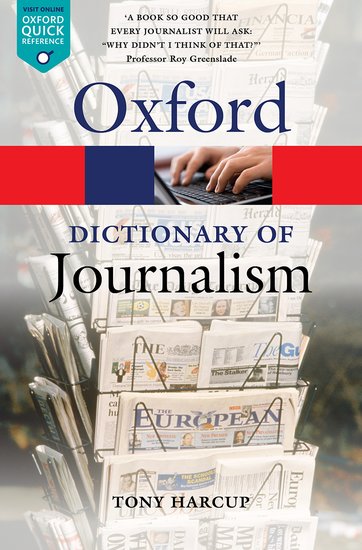Journalists are heroes to some and scumbags to others but the truth is that most are somewhere in the middle, trying to do as good a job as they can, often in difficult circumstances. That, at least, is the view of Tony Harcup, author of A Dictionary of Journalism. We asked him to tell us about some of the good – and not so good – things that journalists do. Do you agree with the below?
By Tony Harcup
The nine best things about journalists:
- We tell you things that you didn’t even know you didn’t know.
- Our default position is healthy scepticism.
- We know that there’s no such thing as a stupid question.
- Our way with words translates jargon into language that actual people use.
- We juggle complex intellectual, legal, commercial and ethical issues every day, simultaneously and at high speed, all while giving the impression of being little deeper than a puddle.
- Our lateral thinking spots the significance of the dog that didn’t bark (noting in the process that Sherlock Holmes was created by a journalist).
- We speak truth to power (or, at least, we say boo to a goose).
- Our gallows humour keeps us going despite the grim stories we cover and the even grimmer people we work with (perhaps the most literal exponent of the art was journalist Ben Hecht who wrote the movies His Girl Friday and The Front Page about hacks covering a hanging).
- We identify with other journalists as fellow members of society’s awkward squad (which is why even those of us who have left the frontline of reporting and become “hackademics” still can’t stop saying “we”).
The nine worst things about journalists:
- We have a tendency to tell young hopefuls that all the quality has vanished from journalism compared to when we started out (journalists have been harking back to a mythical golden age for well over a century).
- Our scepticism can sometimes become cynicism.
- We routinely demand public apologies or resignations from anyone accused of misbehaviour (except ourselves).
- Our way with words is too often used to reduce individuals or communities to stereotypes.
- We have been known to conflate a popular touch with boorish anti-intellectualism.
- Our collective memory lets us down surprisingly often. (We won’t get fooled again? Don’t bet on it.)
- We are in danger of viewing the world through the eyes of whoever employs us, forgetting that, while they might hire us, they don’t own us.
- Our insistence that we are something of a special breed is a bit rich given that most journalistic jobs have more in common with The Office than with All The President’s Men.
- We eviscerate politicians for fiddling their expenses while celebrating hacks from the golden age (see no. 1) for doing exactly the same.
Tony Harcup is Senior Lecturer at the Department of Journalism Studies, University of Sheffield. A Dictionary of Journalism, first edition, will be published 15 May 2014. It covers over 1,400 wide-ranging entries on the terms that are likely to be encountered by students of the subject, and aims to offer a broad, accessible point of reference on an ever-topical and constantly-changing field that affects everyone’s knowledge and perception of the world.
Subscribe to the OUPblog via email or RSS.
Subscribe to only media articles on the OUPblog via email or RSS.
Image credit: Meet the press. By stocksnapper, via iStockphoto.




While not a journalist but a musician, I always admire the hard graft demanded of journalists in seeking the truth. Enjoyed the submission on the Best & Worst things about journalists. Most important I believe in Press Freedom!
“We know that there’s no such thing as a stupid question.”
Never heard of Geoff Shreeves?
Worst things No 10
A tendency to use “cut and paste” without attribution?
“We know a little bit about everything, and a lot about nothing.”
The worst thing about some (too many) journalists is that they think readers are interested in them.
I guess the book would be a template for the professional journalists. I want to buy one. Please tell me how to buy and what’s the price in Indian currency.